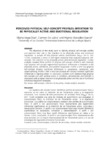Perceived physical self-concept profiles: intention to be physically active and emotional regulation

Ver/
Use este enlace para citar
http://hdl.handle.net/2183/33147Coleccións
- GI-NEURO - Artigos [158]
Metadatos
Mostrar o rexistro completo do ítemTítulo
Perceived physical self-concept profiles: intention to be physically active and emotional regulationData
2023Cita bibliográfica
Vega-Díaz, M., De Labra, C., & González-García, H. (2023). Perceived physical self-concept profiles: intention to be physically active and emotional regulation. Behavioral Psychology/ Psicologia Conductual, 31(1), 179-196.
Resumo
[Abstract] The objectives of the study were to identify physical self-concept profiles and examine their role in the intention to be physically active and emotional regulation. A sample of 606 physical activity practitioners (Mage= 34.19, SD= 13.05), completed a series of self-report measures that evaluated physical selfconcept, the intention to be physically active, and emotional regulation. Cluster analyzes revealed three profiles of physical self-concept. Profile b with relatively high physical self-concept experienced significant differences in intention to be physically active, self-blame, and positive reappraisal. Profile a with low physical self-concept showed significant differences in acceptance, rumination, and catastrophizing. Profile c with a very low physical self-concept revealed significant differences in blaming others. In conclusion, profile b with relatively high physical self-concept and with optimal scores in condition, attractiveness and strength is associated with a higher intention to be physically active and the use of functional emotional regulation strategies. [Resumen] Los objetivos del estudio fueron identificar perfiles de autoconcepto físico y examinar su rol sobre la intención de ser físicamente activo y la regulación emocional. Una muestra de 606 practicantes de actividad física (Medad= 34,19; DT= 13,05) completó una serie de medidas de autoinforme que evaluaban el autoconcepto físico, la intención de ser físicamente activo y la regulación emocional. Los análisis de conglomerados revelaron tres perfiles de autoconcepto físico. El perfil b con autoconcepto físico relativamente alto experimentó diferencias significativas en la intención de ser físicamente activo, autoculpa y reevaluación positiva. El perfil a con autoconcepto físico bajo mostró diferencias significativas en aceptación, rumiación y catastrofización. El perfil c con autoconcepto físico muy bajo reveló diferencias significativas en culpar a los demás. Como conclusión, el perfil b con autoconcepto físico relativamente alto está asociado con la mayor intencionalidad de ser físicamente activo y el uso de estrategias de regulación emocional funcionales.
Palabras chave
Self-concept
Intention to be active
Cluster analysis
Emotion
Autoconcepto
Intención de ser activo
Clúster análisis
Emoción
Intention to be active
Cluster analysis
Emotion
Autoconcepto
Intención de ser activo
Clúster análisis
Emoción
Versión do editor
ISSN
1132-9483





